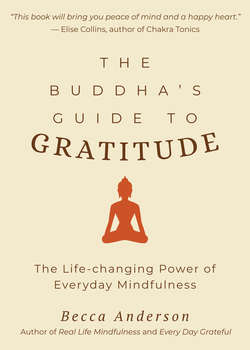Читать книгу The Buddha's Guide to Gratitude - Becca Anderson - Страница 9
На сайте Литреса книга снята с продажи.
ОглавлениеAccording to Buddha, “You have no cause for anything but gratitude and joy.” Being thankful is one of the most powerful tools we humans have to attain peace of mind and a measure of happiness. As it turns out, Buddha had quite a lot to say on the subject of gratitude, including citing it as one of the four keys to the Gate of Heaven. Why is this? Perhaps because of its sheer simplicity, gratefulness is available to all of us at any time. Even in the midst of over busyness, stress, and chaos, we can find plenty to be glad about. Take time to stop each day and count your blessings. This can be a prayer or a mindfulness mediation, whatever works for you. This lovely, uncomplicated approach may well change your life.
Studies show—and experts counsel—that gratitude is a key component of our own happiness. People who are grateful about events and experiences from the past, who celebrate the triumphs instead of focusing on the losses or disappointments, tend to be more satisfied in the present. In a lecture, Buddhist leader Thích Nhất Hạnh stated, “With all I have experienced in my own life, the power of gratitude stands above everything else. In your mindfulness practice, use gratitude until it becomes your way of life.”
Gratitude moves us to do all kinds of things inspired by joy. Gratitude can help us transform our fears into courage, our anger into forgiveness, our isolation into belonging, and another’s pain into healing. Saying “Thank you” every day will create feelings of love, compassion, and hope.
But the fact is, the art of living—for that is what we speak about when we speak of gratitude—isn’t something that comes naturally to most people. Most of us need to work intentionally to increase the intensity, duration, and frequency of positive, grateful feelings—a daunting challenge indeed. But fear not, this book is here to help! I have provided you with mindful meditations, hands-on exercises, profound practices, inspiring quotations, thought-provoking questions, space for writing your own comments, and even positive “power tools” that will help you build a more grateful life. To master the art of being a gratitude practitioner, you have to take time for gratitude every day; that works for me and it will work for you. You’ll be glad and oh-so-thankful you did.
As a meditation instructor, I look for many ways to introduce the skills and states of mindfulness. Sitting in silence, breathing, doing active or restorative yoga poses, or taking a walk are all ways to practice being mindful. One only needs to show up and be deeply engaged. The quotes in this book will help you live mindfully. Like a little coach you can put in your pocket, these mindful quotes guide and instruct the reader to peace and presence. I often use quotes in my yoga classes that introduce the art of mindfulness. Use them daily to give yourself a nibble of quiet and focus. Practice, practice, practice paying attention. Take these quotes and turn to them for contemplation and a deepening of your daily awakening. Use them to help you navigate the sometimes placid, occasionally murky, and periodically turbulent waters of life.
